Cyber Slavery, a Multi-Billion $ Crypto
Cyber Slavery, a Multi-Billion $ Crypto Scam Industry & the Chinese Mob? The Insane Story of Pig-butchering.

 NEFTURE SECURITY I Blockchain Security
NEFTURE SECURITY I Blockchain Security
·
Follow
Published in
Dissecting Web3
24 min read
·
Oct 24, 2022
Listen
Share
More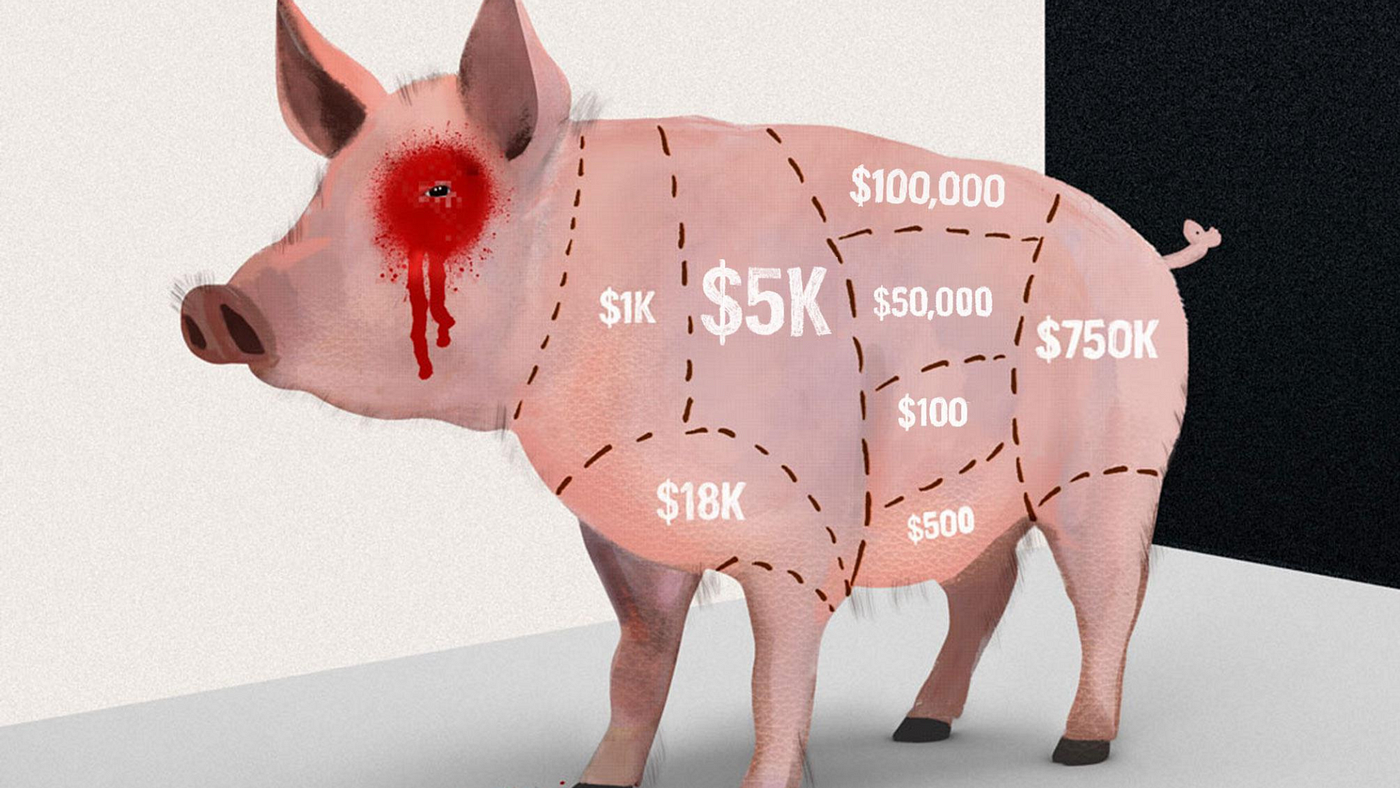 source: Forbes
source: Forbes
Tens of thousands of human-trafficked victims forced under threat of torture, sexual abuse, and death to scam people around the world in industrial-scale scam centers after being taught psychological warfare?
A crypto crime industry worth billions of dollars defrauded from unsuspecting people?
And throw in there the Chinese Mafia?
Yes, you heard it right.
This unimaginable scenario does not come straight from a B-movie, this is reality.
This global scam has a name, it’s called pig-butchering, a fitting name since it refers to “a farmer fattening up a hog before slaughtering it”.
And Cambodia is at its epicenter, Myanmar & Laos following suit.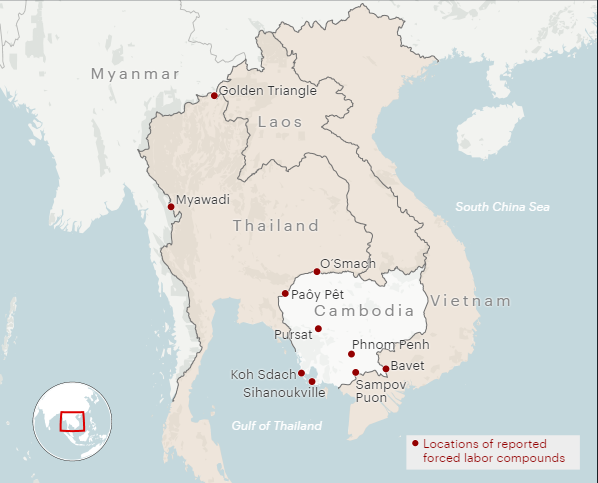 Forced Labor Compounds in Southeast Asia I Map by Lucas Waldron, ProPublica
Forced Labor Compounds in Southeast Asia I Map by Lucas Waldron, ProPublica
This is where enslaved, imprisoned, and abused workforce experiences what the UN Special rapporteur called a “living hell”.
This never seen before mix of cyber slavery and scam industry has found its home in whole cities built around them. Industrial scam centers, prisons really, which for some sit right across Cambodia’s Prime Minister’s house.
All of this built to serve one purpose: trapping people into depositing money into fake crypto platforms.
Their tools?
Sophisticated scams built on intricate psychological manipulation tactics.
In this article, we decided to offer you a full picture of the situation. From the genesis of pig-butchering, to breaking down how enslaved scammers and scam victims were entrapped to where we’re now. Our article could not have existed without the remarkable investigation work of many entities and people, you will find all of our sources at the end of this article.
Let’s get into it!
I. The Genesis of the Pig-Butchering Industry
To explain what happened there is no quote as relevant as this one:
“In the midst of every crisis, lies great opportunity.” — A.Einstein
The pig-butchering industry could have never seen the light of the day if not for a set of crises that prompted its makers into this path.
In fact, these pig-butchering-hub-cities were never created to serve this purpose.
A rundown of how Pig-butchering became what it is today:
2016: The Move
In 2016, Chinese criminal syndicates, among which Triad members if not leaders, had to deal with a huge blow. China and the Philippines had just launched a crackdown on illegal gambling, transnational cyber gambling, and casino proxy gambling aimed mainly at Chinese citizens.
The Philippines had become a gambling hub led by the Chinese Mafia, turning it into ”China’s virtual casino” (IRL Casino too) since Chinese Law forbids citizens from gambling at home. For the Chinese government, gambling is ”harmful to the economic security” of the country alongside its image and stability. So they operated their casino trade aimed at Chinese Citizens from afar.
This huge crackdown basically brought their activities to a stop in the Philippines, they had to relocate.
And what better place than Cambodia to act as a substitute?
. Close to China
. Loose gaming regulations
. Its government “welcomed Chinese investment”
Yes, you heard it right, “ Chinese investment”.
A crucial piece of the puzzle to understand how the Chinese mob gangrened Cambodia is that they presented themselves as real estate tycoon.
They advertised plans to build megacities with high-end housing estates that would welcome the rich Chinese citizens that would flock to these cities,-they promised-, industrial zones,... and, of course, casinos. In short, they promised to rebuild cities almost from the ground up, and damn they did! Just maybe not exactly as they promised. The “Before/After” promised to make of Sihanoukville the second Shenzen I source
The “Before/After” promised to make of Sihanoukville the second Shenzen I source
Sihanoukville, known today as the pig-butchering capital, received millions of dollars from Chinese investors, and the city was transformed from a cute and quiet beach resort to “a metropolis of casinos and ghostly towers in various stages of construction or decay”. Sihanoukville I source
Sihanoukville I source
This is how casino hubs that would later become pig-butchering metropolises started to spread widely in the country until 2019.
2019-2020: The Crises
2019 & 2020 are pivotal years in the pig-butchering industry history:
2019 - The First Blow: Cambodia pressured by China,-which was on a mission to curb overseas online gambling by its citizens-, ban online gambling.
Casinos are left standing on one leg: IRL gambling.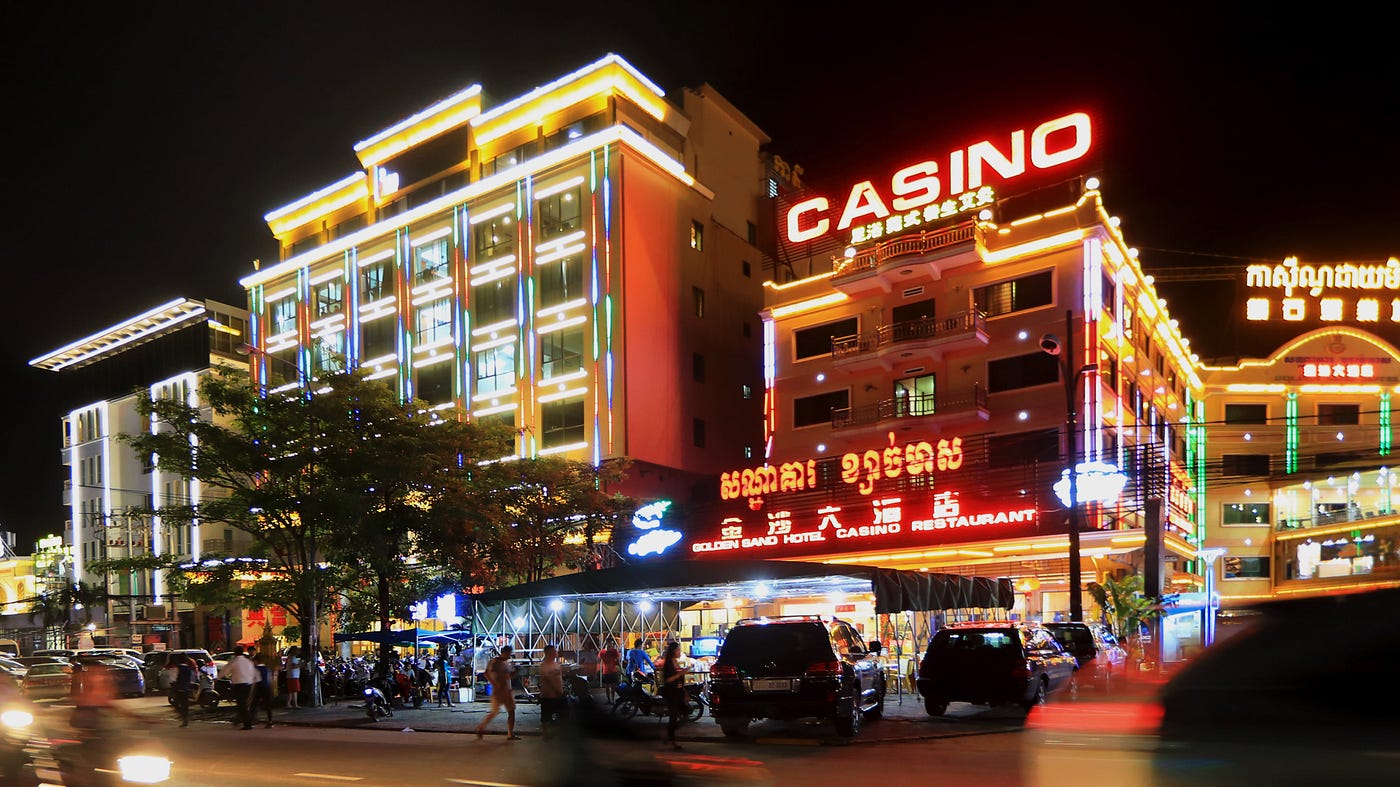 Sihanoukville
Sihanoukville
2020 - The Second Blow: Covid-19 struck. The casino cities are emptied of customers and workers.
TL;DR: Ruin was awaiting them.
2020: The Birth of the Pig-butchering Industry
But Jason Tower, Myanmar country director for the United States Institute of Peace, told Propublica “They’re criminal businesses, but they’re businesses at the end of the day,” he said. “So what did they do? They adapted.”
And adapt they did.
They came up with a new scheme that would prove their most lucrative move yet.
Covid-19 created a set of circumstances that would provide an incredibly fertile ground for the emergence of the pig-butchering Industry.
We dare call them the unholy Trinity:
- The pandemic was an economic hit on average workers that created a desperate job-seeking workforce, among which many with computer skills = future human-trafficked victims
- Covid-19 let a lot of the global population, especially at its peak, feel extremely vulnerable, anxious, uncertain, afraid, and often seeking a way to build financial safety. Cryptocurrencies, although most people knew nothing about how it worked, just that “if you get in it you will get rich quick”, became a possibility, triggering a massive influx of new entrants= future scams victims rip for the picking
- Do you remember the first months of 2020, the first year of Covid-19, when a large number of people across the globe found themselves under lockdown or on full-time remote work? Locked at home, being on our phones helped to kill time. It was thanks to this that TikTok big banged in 2020. People were non-stop on their phones = exactly where the scammers needed them
The stars were all aligned in favor of a new scheme that would involve trafficked humans serving on an industrial scale as scammers who would prey unwillingly on vulnerable people around the globe.
In 2021, the ones who were involved in these Casino-cities schemes repurposed their emptied real-estates into a scamming base of operations. And, without looking back, became full-time, full-fledged, slavers. So at ease with what they do that they have Telegram groups where they sell and buy their future “slaves”. (full story here)
As for their future victims, when they once only targeted inhabitants of the APAC(Asia-pacific), they decided to go global and target with their new scheme wealthy Westerners.
Now that they had a plan, an (unwilling) workforce, and a designed target, they just went for it and thus the Pig-butchering industry was born.
It must be emphasized that this industry could have been nipped in the bud, instead of thriving to the scale it does today. If these scammers were able to implement successfully, in plain sight, a shift that included armed compounds with thousands of enslaved people in them, it’s because local authorities turned a blind eye to what was happening. These cyberfraud operations in Cambodia often have links “not just to organized crime but also to the country’s political and business elites.”
In many cases “these scamming companies are backed up by senior Cambodian officials who benefit financially from these corrupt companies”, said Phil Robertson, deputy Asia director of Human Rights Watch.
That’s how, in a very burlesque fashion, these scam facilities, which are housed “in everything from office buildings to garish casino complexes”, can also be found diagonally across the street from the summer residence of the Cambodian prime minister. This is where the White Sand Palace, a gambling establishment, also houses pig-butchering operations on multiple floors.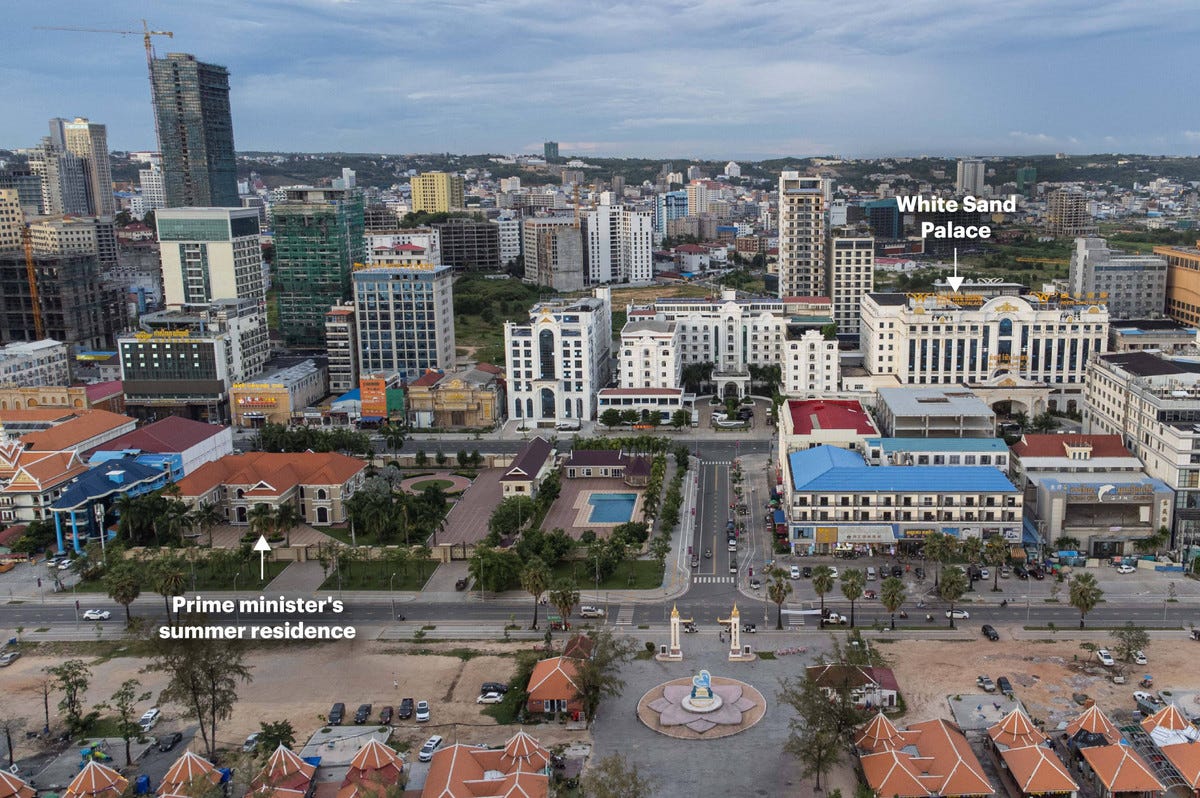 “The White Sand Palace in Sihanoukville is only a block or so from the prime minister’s summer residence.” Source: Propublica
“The White Sand Palace in Sihanoukville is only a block or so from the prime minister’s summer residence.” Source: Propublica
So, no wonder Cambodia became the beating heart of the Pig-butchering industry and had the US State Department downgrade “Cambodia to the lowest tier on its annual assessment of how well countries are meeting standards for eliminating human trafficking” in July 2022.
Now that we know how the Pig-butchering industry emerged, let’s dive into the peculiarities of this complex scam organization.
II. The Human-Trafficked Cyber Slavery Industry
The scammers have a well-defined and extremely successful strategy when it comes to entrapping people into slavery.
First, it is to be noted that although human-trafficked people are often poor and vulnerable, in this case, the people they trap come from all walks of life from cook chiefs to engineers because they need people who can sometimes speak more than one language and are computer-savvy.
It’s impossible to know the exact number of people who have been trafficked, for now, it is estimated at tens of thousands of people from across Asia, it could be much more.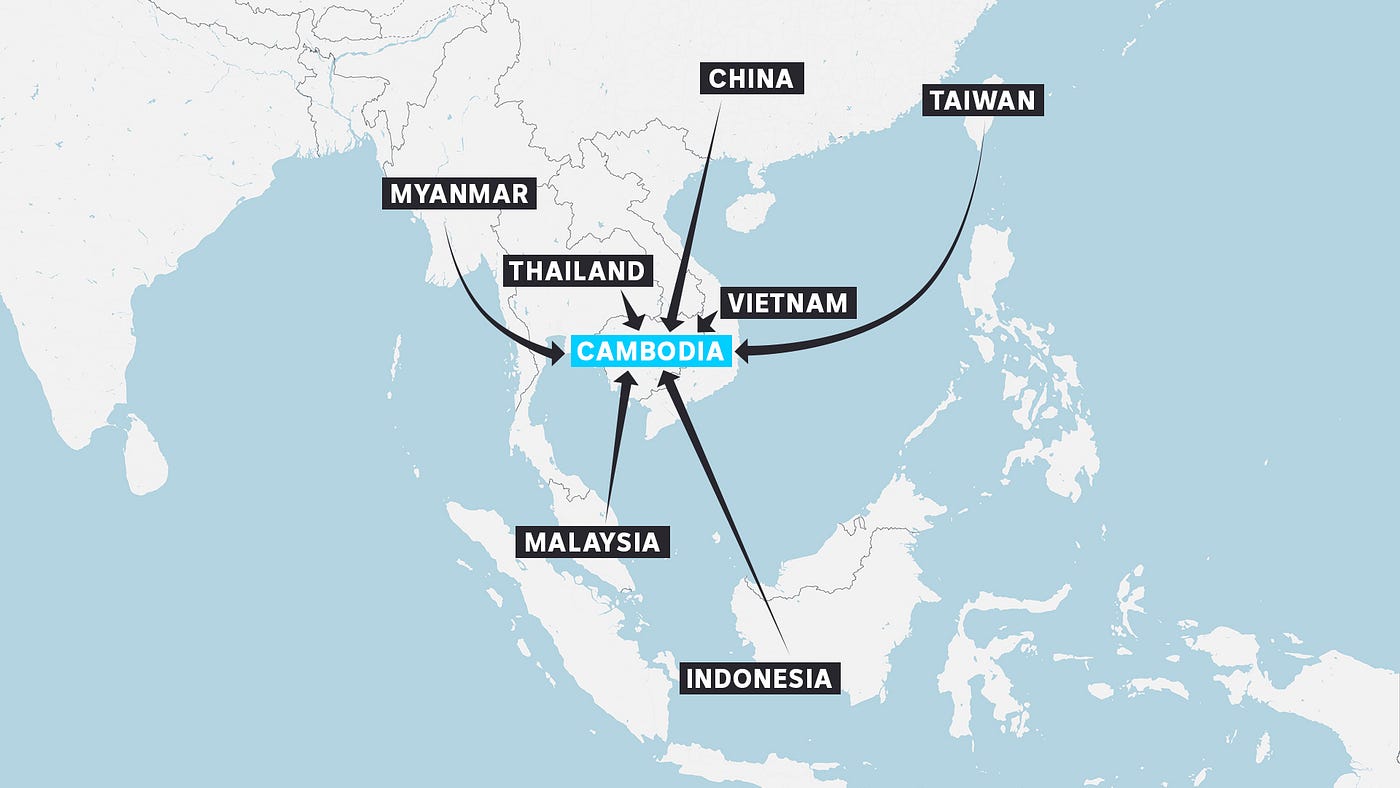 Human-trafficked victims’ origins I source
Human-trafficked victims’ origins I source
Secondly, although there are always variations, the Scammers/Slavers seem to stick to the following Modus Operandi:
1. The Trap
All begin with phony job ads. They are posted mainly on Facebook but you can find them on other social media too. They offer enticing wages by local standards, but nothing so far-fetched it would ring alarm bells in their future victims. To finish convincing them they propose to fly them in. One example of the phony job ads, this one destinated towards Malaysians I source
One example of the phony job ads, this one destinated towards Malaysians I source
2. Kidnapping & Imprisonment
Once the victim has arrived at the airport, not-very-corporate-but-very-tug-looking people “escort” them to their car if they do not protest, throw them in it if they do. They then proceed to wrest from them their passports. They bring them to highly secured compounds, establishments,... heavily guarded most of the time by gun-wielding men and sometimes they even have barbed wire and iron fencing. In other words, they are now prisoners with no way out. And they were doomed from the moment they set foot out of the airport.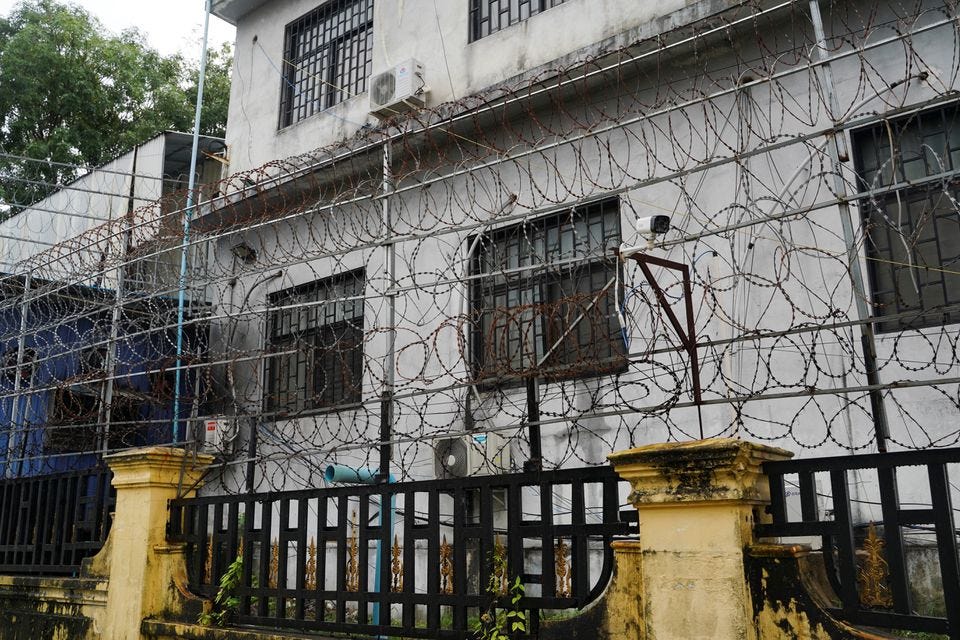 “Barbed wire fences are seen outside a shuttered Great Wall Park compound where Cambodian authorities said they had recovered evidence of human trafficking” I source
“Barbed wire fences are seen outside a shuttered Great Wall Park compound where Cambodian authorities said they had recovered evidence of human trafficking” I source
3. Adapt or Be Tortured
Shortly after their arrival, they are briefed or learn through unnamable experiences about what the rules of their new lives are.
The work they will be assigned has nothing to do with what they signed for (which most of the victims had guessed by then). They are handed 101 self-made guidebooks about how to scam people and told to learn them and once they do they will be given the tools needed to scam them: phones and a computer. “A photo from inside a scam center in Cambodia. The group chat on the computer screen provides scamming tips. ” PHOTO: CHINESE-CAMBODIA CHARITY TEAM I source
“A photo from inside a scam center in Cambodia. The group chat on the computer screen provides scamming tips. ” PHOTO: CHINESE-CAMBODIA CHARITY TEAM I source
Victims will be paid a non-existent “wage” based on commissions that will serve to pay back a “debt” they never contracted aka a ransom. If they want to be freed they have to pay a tremendous ransom, but the based-on-commission salaries are so low they have no hope to pay it back.
A little side note here about why “cyber slaves” are being paid “wages”, we have a theory that it serves possibly two purposes. By giving hope even as slim and non-existent as this one, it’s still a hope of getting out of this “living hell” and they could see it as a way to stop enslaved people from going to extremes. The second one is a legal reason. These scammers have argued multiple times (and won) that the human-trafficked victims are not “slaves” or “trafficked” since they came of their own will and are paid wages. That the allegation made against them was defamation coming from a disgruntled employee.
If they refuse to comply and work at defrauding people, they will either suffer from food deprivation, electrocution and other tortures, sexual abuse, extremely violent beating and, ultimately, in some cases, death. A man watches a video of abuse inside Cambodian cyber-scam operations I source
A man watches a video of abuse inside Cambodian cyber-scam operations I source
They have to work non-stop, around the clock, as a victim told Propublica their days were made of “either eating, sleeping or working”. Their working hours matched the GMT of their target locations.
Their sleeping quarters were dorm rooms with bunk beds. They weren't allowed outside, for the ones working in casinos they could sometimes access them, probably so that the victims would become even more indebted to the scammers. Indonesian victims in a scam center I source
Indonesian victims in a scam center I source
Thankfully, some of them succeed in escaping and sometimes even freeing other people alongside them.











![[LIVE] Engage2Earn: auspol follower rush](https://cdn.bulbapp.io/frontend/images/c1a761de-5ce9-4e9b-b5b3-dc009e60bfa8/1)









![[ℕ𝕖𝕧𝕖𝕣] 𝕊𝕖𝕝𝕝 𝕐𝕠𝕦𝕣 𝔹𝕚𝕥𝕔𝕠𝕚𝕟 - And Now What.... Pray To The God Of Hopium?](https://cdn.bulbapp.io/frontend/images/79e7827b-c644-4853-b048-a9601a8a8da7/1)







